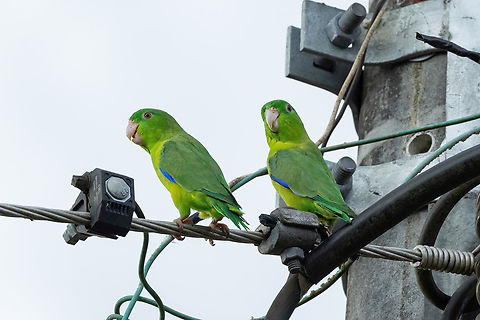
Appearance
Riparian parrotlets are typically 12–13 centimetres long and weigh about 28 grams. Their bodies are mostly yellow-green. Eyes are dark brown and beaks and feet are light peach. Riparian parrotlets are sexually dimorphic: males have blue rumps and lower backs, with blue feathers along the leading edges of their wings and blue secondaries; primary coverts are blue-gray. Females have no blue feathers and a yellow-green belly.Distribution
Riparian parrotlets tend to inhabit forest edges, riparian woodlands, and degraded or deforested areas.Status
This species is currently unrecognized by the IUCN Red List, so it does not have an official conservation status. Its populations are included in estimates of cobalt-rumped parrotlets, which are listed as Least Concern with a stable population. It is suggested that the population of riparian parrotlets is relatively low.Behavior
Like all members of the genus "Forpus", riparian parrotlets are highly gregarious and are often seen in flocks of up to 100 birds.Habitat
Riparian parrotlets tend to inhabit forest edges, riparian woodlands, and degraded or deforested areas.Reproduction
Riparian parrotlets nest in tree cavities or similar places. They have been known to use the abandoned nests of rufous horneros and other unrelated species.Females lay 3-7 small white eggs, which are incubated for approximately 18 days before hatching.
Food
Riparian parrotlets feed on seeds, fruits, flowers, buds, and other plants. They favor palm, "Cecropia" sp., "Handroanthus serratifolius" flowers and nectar, and "Ceiba speciosa" fruits.References:
Some text fragments are auto parsed from Wikipedia.